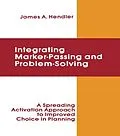A recent area of interest in the Artificial Intelligence community has been the application of massively parallel algorithms to enhance the choice mechanism in traditional AI problems. This volume provides a detailed description of how marker-passing -- a parallel, non-deductive, spreading activation algorithm -- is a powerful approach to refining the choice mechanisms in an AI problem-solving system.
The author scrutinizes the design of both the algorithm and the system, and then reviews the current literature and research in planning and marker passing. Also included: a comparison of this computer model with some standard cognitive models, and a comparison of this model to the "connectionist" approach.
Autorentext
James A. Hendler Department of Computer Science, The University of Maryland
Inhalt
Contents: Foundations. Introduction. On Problem-Solving and Planning. On Marker-Passing and Spreading Activation. Integrating Marker-Passing and Problem-Solving -- The Inside Story. Inside the Path Evaluator. Designing a Marker-Passer. C-SCRAPS -- Adding Concurrency. Cognitive Aspects. On Marker-Passing and Connectionism. SCRAPS in Action. Conclusion.
